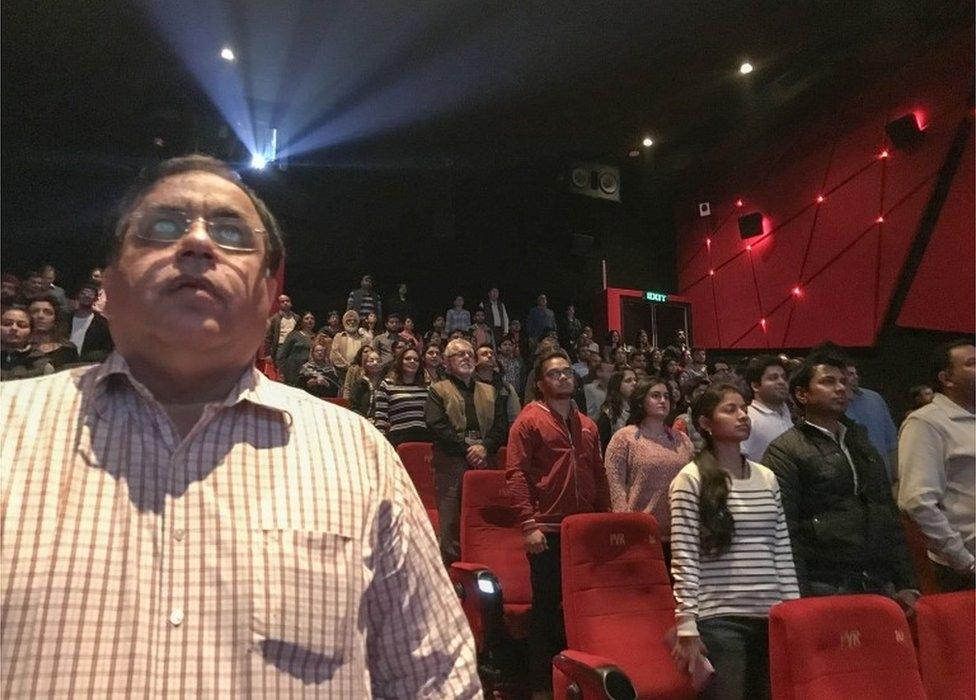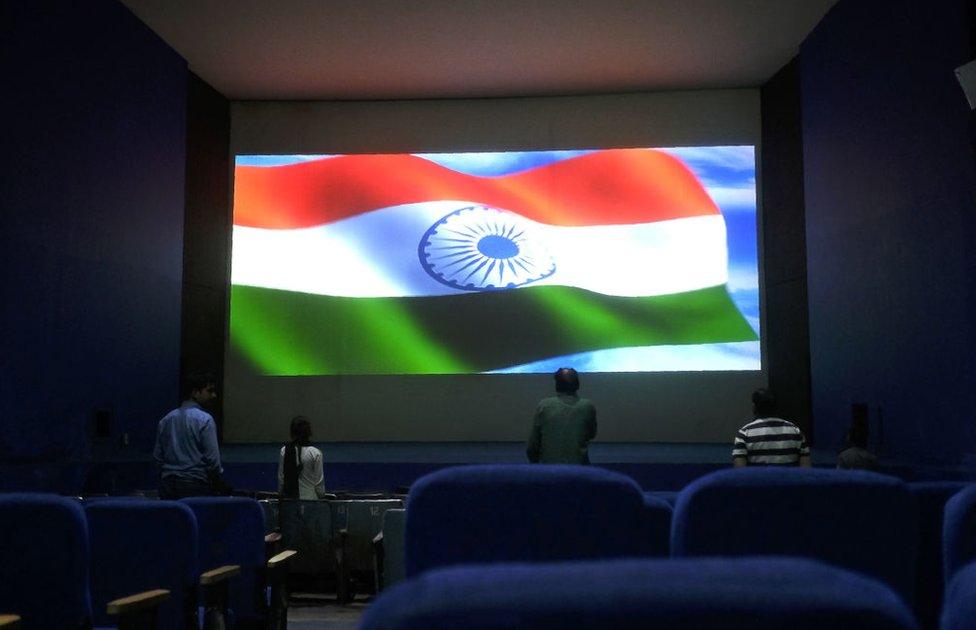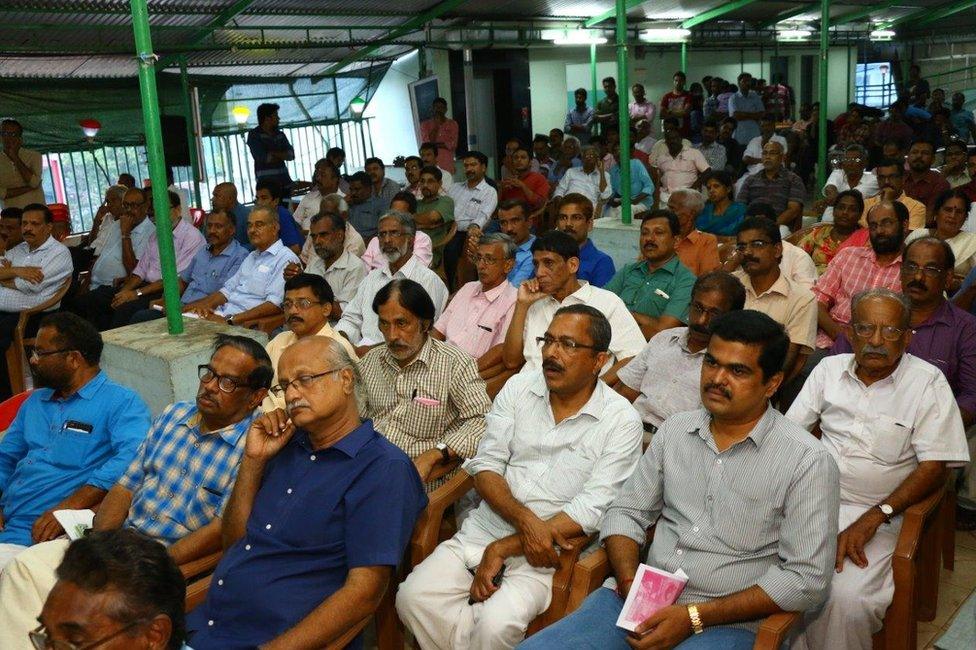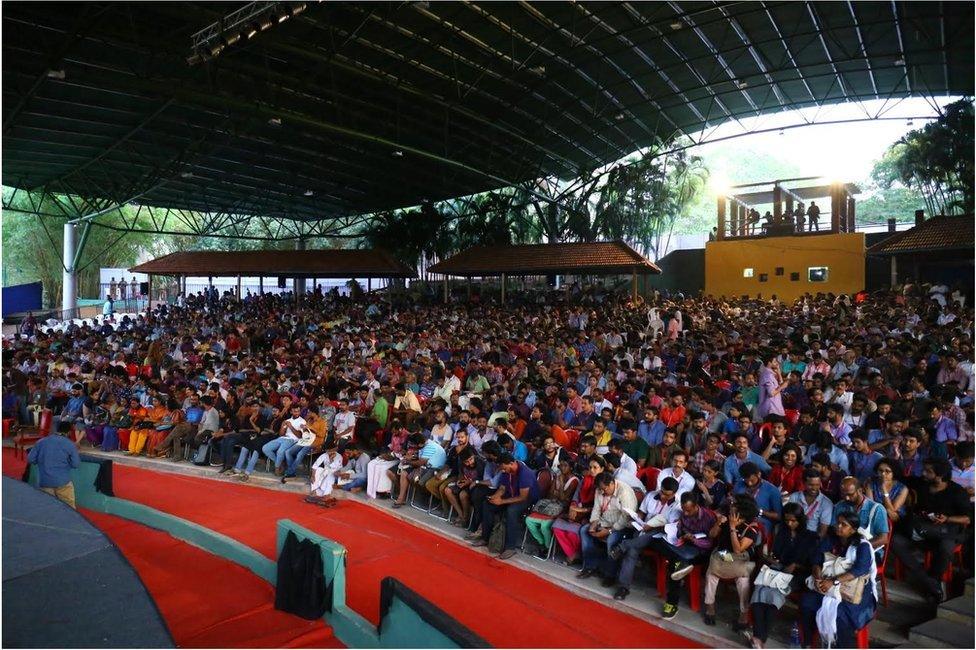The small town film fans challenging India's anthem order
- Published

Last year the top court ruled that the national anthem be played before every film and that audiences stand
One evening last week, some 200 people gathered on the roof of a shopping centre in a small town in the southern Indian state of Kerala to watch 4 Months, 3 Weeks and 2 Days, a gripping 2007 film on the last days of Communist rule in Romania.
"It was very well received by the audience, as most of our movies are," Anoop Kumaran of the eponymous Kodungallur Film Society, one of Kerala's 60-odd film clubs, told me.
For the past six years, the club's Friday evening rooftop cinema show has enthralled cine-goers in the historical town of Kodungallur, home to India's first mosque, among other things. The audience is an unusual collection of cineastes - students, teachers, traders, writers, lawyers, engineers, daily wage workers. Many of them are among the 47-year-old club's 175 paid-up members.
Admission is free, and you just have to arrive a little early to grab a plastic chair under a tin roof to watch Indian regional and world cinema. The club pays 500 rupees ($7; £5.80) as rent for each show. No Hollywood or Bollywood films are shown. The club also organises a festival (23 films in three days in the local cineplex last year), runs film appreciation courses for local enthusiasts, hosts theatre performances, and gives away a modest $384 (£290) cash award to a "legend" of the local Malayalam film industry every year.
These days the Kodungallur Film Society is in the news for a different reason. The small-town cinema lovers have mounted a spirited challenge to last year's controversial Supreme Court ruling that the national anthem be played before every film and that audiences stand while it is played.

India's national anthem in cinema rules

A 1971 law, external called the The Prevention of Insults To National Honour makes any obstruction to the singing of the anthem "or causing disturbances to any assembly engaged in such singing" punishable by a three-year prison term and/or a fine.
In the 1960s and 1970s, cinemas regularly played the anthem but the practice declined.
There is no uniform law in India regarding the anthem and its 29 states have had their own laws on the issue.
But last October's Supreme Court ruling gives national authority to what was previously a rash of loosely-followed, state-specific laws.
The ruling says that the anthem must be played in all cinemas, accompanied by an image of the Indian flag, and everyone must stand.
It also stated that the doors must remain closed to prevent people from entering or leaving.
The court later amended the ruling to exempt disabled people from standing.

Last October's ruling had come at a time of routine demands on Indians to display patriotism, and was cheered by the ruling Hindu nationalist BJP with sometimes unfortunate consequences.
A disabled man in a wheelchair was assaulted by other members of the audience for not standing for the anthem in a theatre in the western state of Goa. There were a spate of arrests of people who remained seated while the national anthem played in cinemas, and right-wing vigilantes were accused of taking the law into their own hands and harassing cinemagoers.
Around this time, some members of the Kodungallur Film Society travelled to Kerala's capital, Trivandrum, to attend an international film festival. "It became quite ridiculous," PV Dinesh, who filed the petition against the ruling soon after, told me. "There were half a dozen screenings every day, and delegates had to stand up every time the national anthem was played before the film."

Some 200 people turn up every Friday evening to watch art-house films on the roof of a shopping centre in Kodungallur
The petition seeking a recall of the controversial order is a fine example of pragmatic reasoning. It says forcing people to play the national anthem and stand while it is being played "infringes fundamental rights", and talks about the the false equivalence between an "outward show of respect" and an "actual sentiment of respect".
It says cinema halls are "spaces that are singularly unsuited for the gravitas and sobriety that must accompany the playing of the national anthem."
"People go to cinema halls for a variety of reasons, primary among which is entertainment. The themes of many of the films played at cinema halls will be at odds with sentiments of national respect," the petition adds.

People were arrested at a film festival in Kerala last year after they remained seated during the national anthem
On Monday, a divided court argued the "national anthem" case.
There was some levity in the court room when a lawyer said there would come a time when hundreds of people watching movies on public TV in crowded railway waiting rooms and airports would all have to stand up when the national anthem was played on their screens.
One of the judges seemed to agree with the cinema lovers. "Tomorrow, there may be a demand to stop people from wearing shorts and T-shirts while going to cinema halls, because national anthem is being played. Where is the end for such moral policing?" Judge DY Chandrachud quipped.
"Why should we assume that if you don't stand during the playing of national anthem, you cease to be patriots?"
Many Indians have been asking the same question. In the end, Chief Justice Dipak Misra asked the government to "take a call", external on the national anthem, "uninfluenced" by last year's court order. The next hearing is on 9 January. "By this time the government would have either taken some steps, or decided not to. So we'll see," says Delhi-based lawyer Gautam Bhatia.
Back in Kodungallur, feisty movie-goers are waiting for the next show at the roof-top cinema. This Friday, they are going to watch 2013's Wadjda,, external the story of a young girl living in a suburb of Riyadh and the first feature film shot entirely in Saudi Arabia. "We expect a full house," says Mr Kumaran.